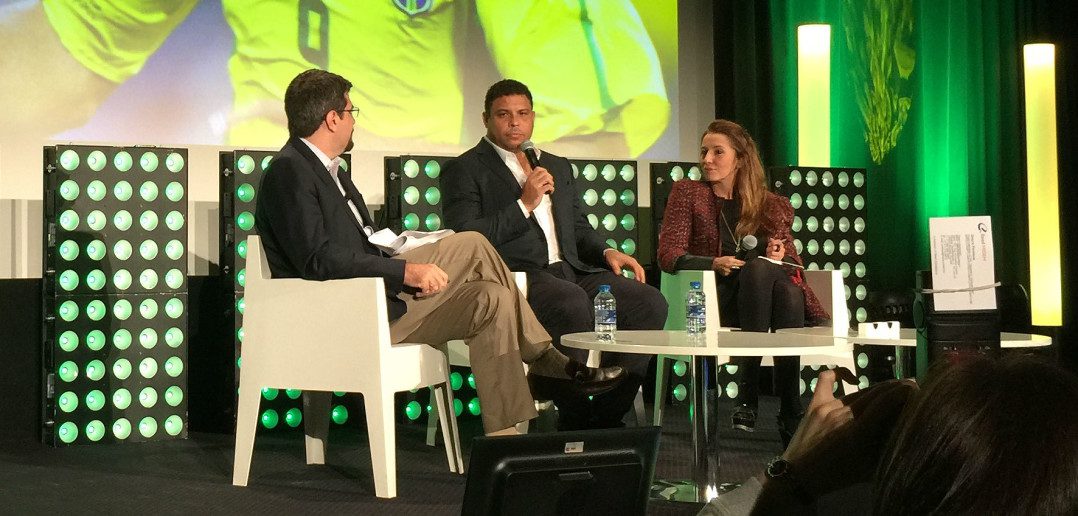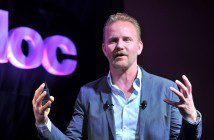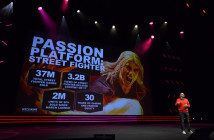Former footballer Ronaldo was greeted by a forest of cameraphones and selfie requests in the Esterel room this morning, as he arrived for Brazilian broadcaster Globo’s Sports, Big Shows and Passionate Fans session. There were certainly plenty of passionate fans queuing up for a photo with him.
Ronaldo joined Globo‘s executive sports director João Pedro Paes Leme and PR manager Duda Pereira – who translated – for the session, which explored how the worlds of television and football fandom intersect.
Leme noted that Globo is involved in publishing and radio as well as TV, where it has free-to-air, pay-TV and digital channels. That includes its three SporTV channels, as well as the Globoesporte.com website. It’s now preparing for the 2016 Olympic Games, two years after football’s World Cup. « We have decided to use three pillars for our communication with the public: outstanding storytelling, innovative technology, and also using top sports talents, » he said.
On came Ronaldo to talk first about his first MIPTV. « It’s an honour to be here with you. My relationship with Globo has existed for some time, » he said. « Since I was a young boy in the suburbs of Rio we used to get together to watch the World Cup… this relationship with Globo has existed since I was a little boy. All my career I’ve been with Globo… I’m very happy to be part of this team and be a commentator now. »
Ronaldo spent much of his footballing career in Europe. « I feel like [I’m at] home, » he grinned, before talking about his transition to the commentary box. « I try to do what I love, and I do what I love with a lot of responsibility. We have 200m Brazilians watching us most of the time, and the dynamics of the transition is very fast. We have to be very technical and very quick, » he said.
« I try to be impartial, neutral and of course always with my opinion, which is why they invited me to be there. In the World Cup, in the 7-1 [loss to Germany]it was crazy and unexpected, and somewhat difficult to live… In the transmission it was very hard, because I’m Brazilian, and my heart is always there. »
Leme added that there were 2,500 staff involved with Globo’s World Cup coverage, almost six times the number of people it usually takes to cover the competition abroad. « Nearly 400 hours of content and also at Globo, free-to-air TV, an average reach of 40 million people per minute. » And lots of travel for Ronaldo during the tournament. « It was an honour participating and travelling in Brazil, seeing the country and seeing how the people felt with these players. »
What are Ronaldo’s favourite sports beyond football? « I love to play tennis. I’m not so good! » said Ronaldo, before predicting that Brazil can fare well in this summer’s Olympic Games, winning the first gold medal in the country’s history. « I think it’s a very important moment for Brazilian soccer. We have a fantastic generation of young, good players. It’s a huge motivation playing at home. I think we have to end this myth of the gold medal being the only thing we miss for the Olympics. »
Ronaldo talked about the tougher times in his career, and the support he felt he got from Globo at those times. « Globo has always been a reference for me. I’ve always looked up to Globo. This relationship, this friendship that I’ve been having with Globo since my young age still exists, » he said. Leme noted that Globo wasn’t afraid to criticise Ronaldo when he wasn’t playing well. « I never looked for a relationship which wasn’t based in truth. The evaluation, the criticism always motivated me to become better, and to try harder. This relationship of truth is what makes me be part of this team. »
Ronaldo enjoyed the last World Cup as a commentator. « I think the public enjoyed it. It’s a very interesting experience that I lived through… the dynamics of the games and the live games, and being able to talk to the main players after these games. Sometimes it was me being a fan to an idol, and the other way around as well. It was very informal, and I think the public really enjoyed this informality and this truthfulness in our conversations. »
The conversation turned to the Olympic Games again. « It is a very big challenge for all of us. I will be commentating on football, but I want to also watch other sports! » said Ronaldo. « You’re going to be in the volleyball and the swimming! » joked Leme. But Ronaldo finished by talking about the importance of the Olympic Games. « This experience of sharing, training, this constant change of experience between athletes is very important. And especially it’s important as a form of social inclusion: not only soccer but all other sports. »




